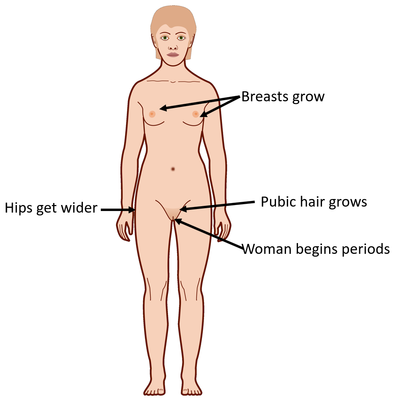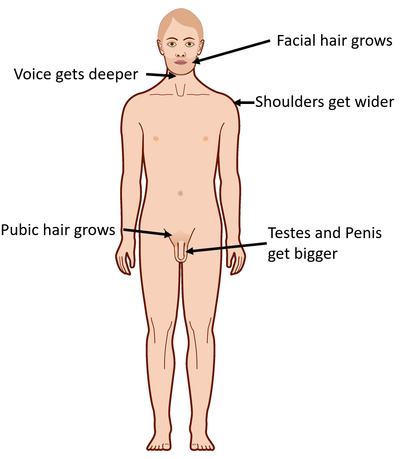Puberty
Contents
Key Stage 3
Meaning
Puberty is when an organism goes through physical and mental changes that make it able to produce offspring.
About Puberty in Females
| A diagram showing some of the changes that happen to females in puberty. |
About Puberty in Males
| A diagram showing some of the changes that happen to males in puberty. |
It's normal
Puberty can be a confusing experience and people always have lots of questions. These are the answers to some common questions you might like to know.
Girls:
- One breast will grow a bit quicker than the other.
- Once the breasts have grown one is often bigger than the other.
- Your first period may be unexpected so you may want to keep a sanitary towel just in case.
- You should have your first period between 10 and 15 years old. If it happens a bit earlier that's not a problem. If it doesn't happen by 16 you should speak to a doctor.
- At first your period might not happen every month.
- Your period should not last more than 7 days. If it lasts longer, then you should talk to a doctor.
- The vagina sometimes releases some clear fluid. If the fluid is cloudy or yellow you should talk to a doctor.
Boys:
- One testis hangs slightly lower than the other.
- You will get random erections that can be embarrassing but are perfectly normal.
- Sometimes you will wake up with an erection.
- You may have a 'wet dream' where you ejaculate in your sleep. You may want to find out how to use the washing machine if you are embarrassed.
References
AQA
- Puberty, page 168-169, GCSE Biology; Third Edition, Oxford University Press, AQA
- Puberty, page 189, GCSE Combined Science Trilogy; Biology, CGP, AQA
- Puberty, page 225, GCSE Biology, CGP, AQA
- Puberty, page 63, GCSE Combined Science; The Revision Guide, CGP, AQA
- Puberty, page 77, GCSE Biology; The Revision Guide, CGP, AQA
- Puberty, pages 11, GCSE Combined Science Trilogy 2, Hodder, AQA

